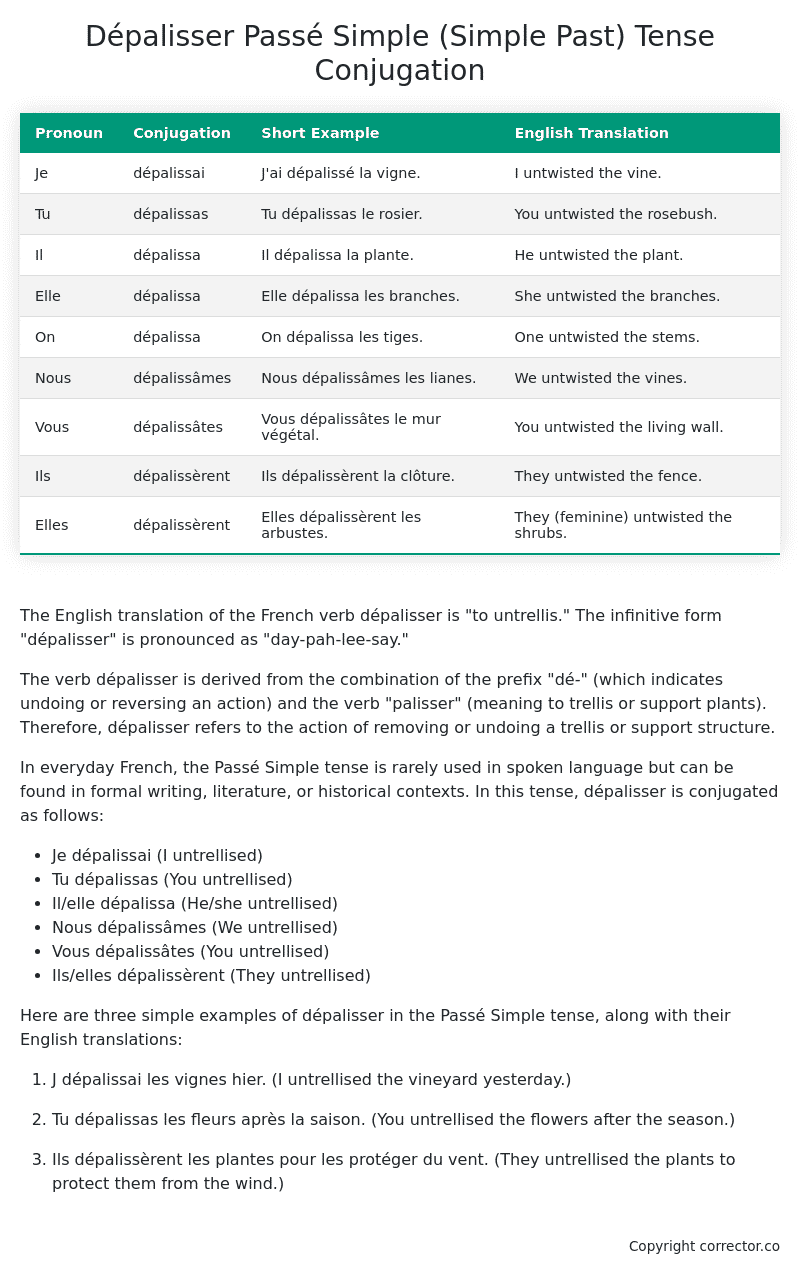Passé Simple (Simple Past) Tense Conjugation of the French Verb dépalisser
Introduction to the verb dépalisser
The English translation of the French verb dépalisser is “to untrellis.” The infinitive form “dépalisser” is pronounced as “day-pah-lee-say.”
The verb dépalisser is derived from the combination of the prefix “dé-” (which indicates undoing or reversing an action) and the verb “palisser” (meaning to trellis or support plants). Therefore, dépalisser refers to the action of removing or undoing a trellis or support structure.
In everyday French, the Passé Simple tense is rarely used in spoken language but can be found in formal writing, literature, or historical contexts. In this tense, dépalisser is conjugated as follows:
- Je dépalissai (I untrellised)
- Tu dépalissas (You untrellised)
- Il/elle dépalissa (He/she untrellised)
- Nous dépalissâmes (We untrellised)
- Vous dépalissâtes (You untrellised)
- Ils/elles dépalissèrent (They untrellised)
Here are three simple examples of dépalisser in the Passé Simple tense, along with their English translations:
-
J dépalissai les vignes hier.
(I untrellised the vineyard yesterday.) -
Tu dépalissas les fleurs après la saison.
(You untrellised the flowers after the season.) -
Ils dépalissèrent les plantes pour les protéger du vent.
(They untrellised the plants to protect them from the wind.)
Table of the Passé Simple (Simple Past) Tense Conjugation of dépalisser
| Pronoun | Conjugation | Short Example | English Translation |
|---|---|---|---|
| Je | dépalissai | J’ai dépalissé la vigne. | I untwisted the vine. |
| Tu | dépalissas | Tu dépalissas le rosier. | You untwisted the rosebush. |
| Il | dépalissa | Il dépalissa la plante. | He untwisted the plant. |
| Elle | dépalissa | Elle dépalissa les branches. | She untwisted the branches. |
| On | dépalissa | On dépalissa les tiges. | One untwisted the stems. |
| Nous | dépalissâmes | Nous dépalissâmes les lianes. | We untwisted the vines. |
| Vous | dépalissâtes | Vous dépalissâtes le mur végétal. | You untwisted the living wall. |
| Ils | dépalissèrent | Ils dépalissèrent la clôture. | They untwisted the fence. |
| Elles | dépalissèrent | Elles dépalissèrent les arbustes. | They (feminine) untwisted the shrubs. |
Other Conjugations for Dépalisser.
Le Present (Present Tense) Conjugation of the French Verb dépalisser
Imparfait (Imperfect) Tense Conjugation of the French Verb dépalisser
Passé Simple (Simple Past) Tense Conjugation of the French Verb dépalisser (You’re reading it right now!)
Passé Composé (Present Perfect) Tense Conjugation of the French Verb dépalisser
Futur Simple (Simple Future) Tense Conjugation of the French Verb dépalisser
Futur Proche (Near Future) Tense Conjugation of the French Verb dépalisser
Plus-que-parfait (Pluperfect) Tense Conjugation of the French Verb dépalisser
Passé Antérieur (Past Anterior) Tense Conjugation of the French Verb dépalisser
Futur Antérieur (Future Anterior) Tense Conjugation of the French Verb dépalisser
Subjonctif Présent (Subjunctive Present) Tense Conjugation of the French Verb dépalisser
Subjonctif Passé (Subjunctive Past) Tense Conjugation of the French Verb dépalisser
Subjonctif Imparfait (Subjunctive Imperfect) Tense Conjugation of the French Verb dépalisser
Subjonctif Plus-que-parfait (Subjunctive Pluperfect) Tense Conjugation of the French Verb dépalisser
Conditionnel Présent (Conditional Present) Tense Conjugation of the French Verb dépalisser
Conditionnel Passé (Conditional Past) Tense Conjugation of the French Verb dépalisser
Conditionnel Passé II (Conditional Past II) Tense Conjugation of the French Verb dépalisser
L’impératif Présent (Imperative Present) Tense Conjugation of the French Verb dépalisser
L’impératif Passé (Imperative Past) Tense Conjugation of the French Verb dépalisser
L’infinitif Présent (Infinitive Present) Tense Conjugation of the French Verb dépalisser
L’infinitif Passé (Infinitive Past) Tense Conjugation of the French Verb dépalisser
Le Participe Présent (Present Participle) Tense Conjugation of the French Verb dépalisser
Le Participe Passé (Past Participle) Tense Conjugation of the French Verb dépalisser
Struggling with French verbs or the language in general? Why not use our free French Grammar Checker – no registration required!
Get a FREE Download Study Sheet of this Conjugation 🔥
Simply right click the image below, click “save image” and get your free reference for the dépalisser Passé Simple tense conjugation!

Dépalisser – About the French Passé Simple (Simple Past) Tense
Formation
Usage
Narration
Historical Context
Interactions with other tenses
Passé Composé
Imparfait
Conditional and Subjunctive
Summary
I hope you enjoyed this article on the verb dépalisser. Still in a learning mood? Check out another TOTALLY random French verb conjugation!


